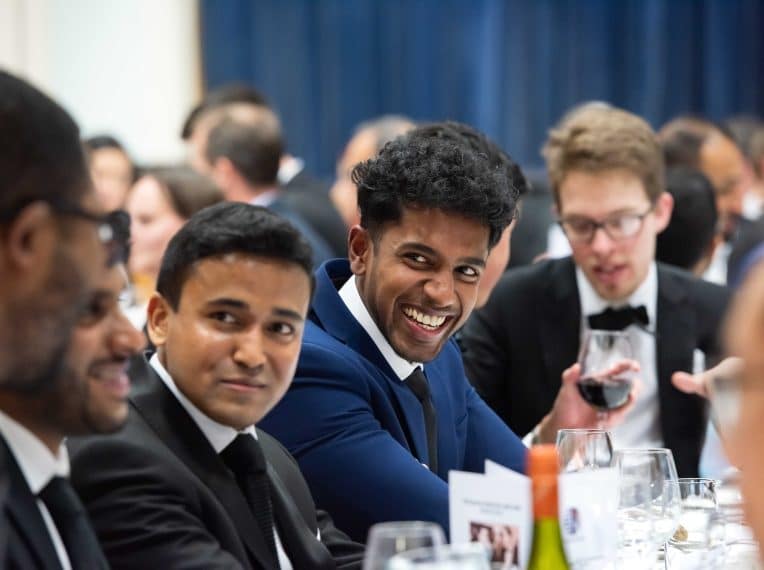
Former pupils from across the generations turned out in force for the annual Old Elizabethans Association Dinner, enjoying the opportunity to celebrate with fellow alumni, rekindling past friendships and forging new ones.
During an evening marked by much convivial chatter and by lively speeches, the diners also observed a silence in memory of former Headmaster Eamonn Harris, one of the great figures in the School’s recent history, who passed away only a few days before the dinner.
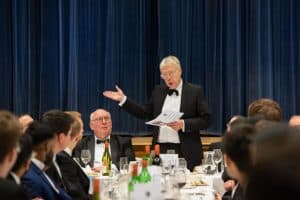 The celebratory tone was amplified by a good attendance from the ‘ten-year leavers’ – the class of 2009–2010 – while older Elizabethans present included Brian Gilbert, returning to the School after a gap of 50 years.
The celebratory tone was amplified by a good attendance from the ‘ten-year leavers’ – the class of 2009–2010 – while older Elizabethans present included Brian Gilbert, returning to the School after a gap of 50 years.
The event in the Main Hall was the first dinner to be hosted by the new President of the Old Elizabethans Association, Eric Houston, who taught at the School from 1976 until he retired, as Second Master, in 2010. Mr Houston is both a Governor and a Foundation Trustee of the School.
Another change this year was the reading at the dinner of the Queen Elizabeth’s School Prayer before grace was said. (The prayer is appended below.)
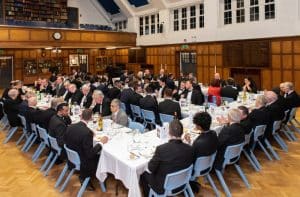 In his speech, Headmaster Neil Enright paid fulsome tribute to Mr Harris (HM 1984–1999): “Few can have had such a profound, transformational and lasting impact on Queen Elizabeth’s as Eamonn Harris, without whom we, quite simply, may well not be sitting here this evening.
In his speech, Headmaster Neil Enright paid fulsome tribute to Mr Harris (HM 1984–1999): “Few can have had such a profound, transformational and lasting impact on Queen Elizabeth’s as Eamonn Harris, without whom we, quite simply, may well not be sitting here this evening.
“His bold decision-making, in making the School independent of the local education authority and then restoring academic selection, and the high expectations he had for all in the School community are the bedrocks of our present pre-eminence. We all owe him a debt of great respect and gratitude.”
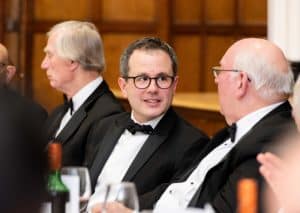 Mr Enright reported on significant developments during the year, including “the exciting news that we have secured £2.2m of government funding…for our new Music School”.
Mr Enright reported on significant developments during the year, including “the exciting news that we have secured £2.2m of government funding…for our new Music School”.
To prepare the site, the Mayes Building was demolished during the summer. This facility was named in honour of Harry ‘Curly’ Mayes who “spent a full 60 years (from 1902 to 1962) as butler, porter, steward and then caretaker”.
Alluding both to Mr Harris and to Mr Mayes, the Headmaster said: “The present fortunes of the School have been built upon the foundations of the great service given by so many.”
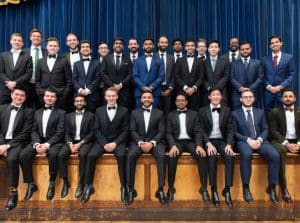 Mr Enright gave a warm, if piquant, welcome to the many ten-year leavers at table, pointing out that Assistant Head David Ryan had described this particular group “as his most challenging in all his years in the Sixth Form”!
Mr Enright gave a warm, if piquant, welcome to the many ten-year leavers at table, pointing out that Assistant Head David Ryan had described this particular group “as his most challenging in all his years in the Sixth Form”!
“I’m not, though, surprised to see a good turnout, as they have actually proved to be one of the more actively engaged alumni cohorts and are doing lots of good work in support of the School,” he added.
“They were, and remain (on this evening’s evidence), a very sociable and enthusiastic group and it is always a great pleasure to have them here at School events.”
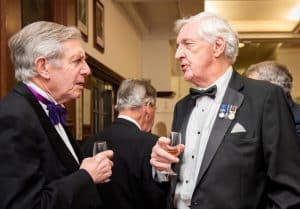 He reported on the start of a project to digitise QE’s archives, beginning with photographs.
He reported on the start of a project to digitise QE’s archives, beginning with photographs.
And, he said, with the School’s 450th anniversary in 2023 approaching, his predecessor as Headmaster, Dr John Marincowitz (1999–2011), was well on the way to completing his book on the School’s history.
“Recording and giving access to the School’s history is important so that the contributions of people such as Eamonn and Curly Mayes are remembered and so that generations of Elizabethans to come are able to learn about their place in the long and fascinating narrative.”
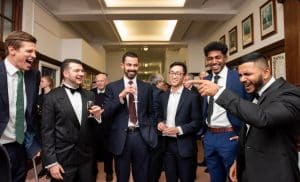 Mr Enright concluded his speech with a report on QE Connect, the School’s recently launched online community for alumni, which has gained more than 450 members in the space of just a few weeks.
Mr Enright concluded his speech with a report on QE Connect, the School’s recently launched online community for alumni, which has gained more than 450 members in the space of just a few weeks.
“Whilst we want to help OEs connect to the past, we also have QE Connect to help enable connections in the present and the future,” he said.
The School Prayer
O Lord God, the Maker and Builder of every house not made with hands, we give thee thanks for this School in which we have our share.
Give thy blessing, we beseech thee, to all this our body, to the Head Master, to the members of the staff, to the boys, and to those who minister our needs.
Inspire us, O Lord, so to do our work today that, even as we are being helped by the remembrance of the loyal lives of those who came before us, so our faithfulness in thy service may aid those who shall take our places.
Remember, O Lord, for good, all who have gone forth from this School, to labour elsewhere in thy kingdom.
Grant that both they, and we, may fulfil thy purpose for us in this life, and finally may attain thine everlasting kingdom, through Jesus Christ our Lord.
Amen.
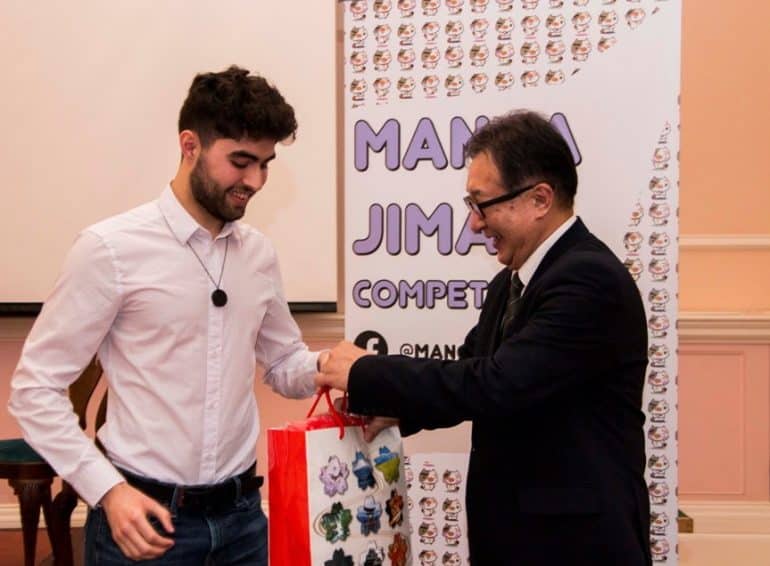
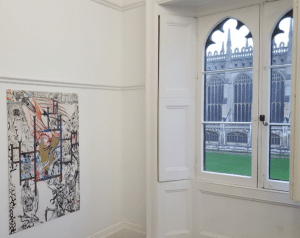 Danny’s work was displayed in the Art rooms at King’s, overlooking the famous chapel, in an exhibition he entitled Full House.
Danny’s work was displayed in the Art rooms at King’s, overlooking the famous chapel, in an exhibition he entitled Full House.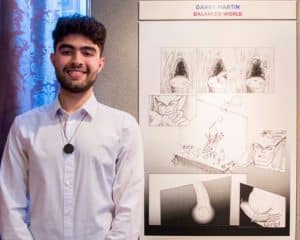 Danny describes it as “a unique take on the creation story where two God-like characters that represent nature’s opposites work together to create a world from scratch”.
Danny describes it as “a unique take on the creation story where two God-like characters that represent nature’s opposites work together to create a world from scratch”.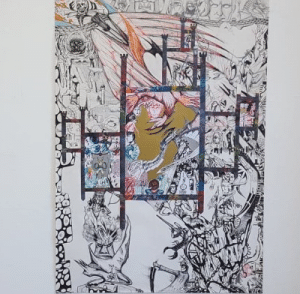 “I present to you Full House, one man’s fantasia that, like real life, has not enough facts, too many villains and a ubiquitous sense of the unknowing.
“I present to you Full House, one man’s fantasia that, like real life, has not enough facts, too many villains and a ubiquitous sense of the unknowing.
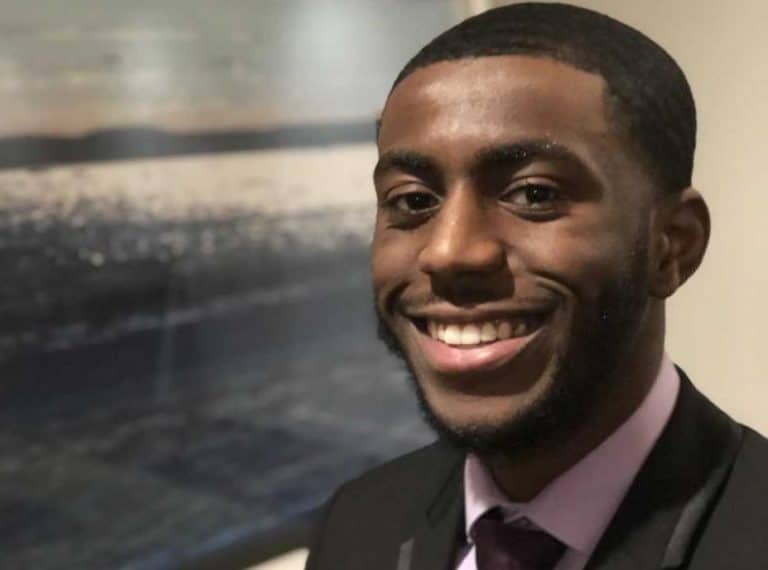
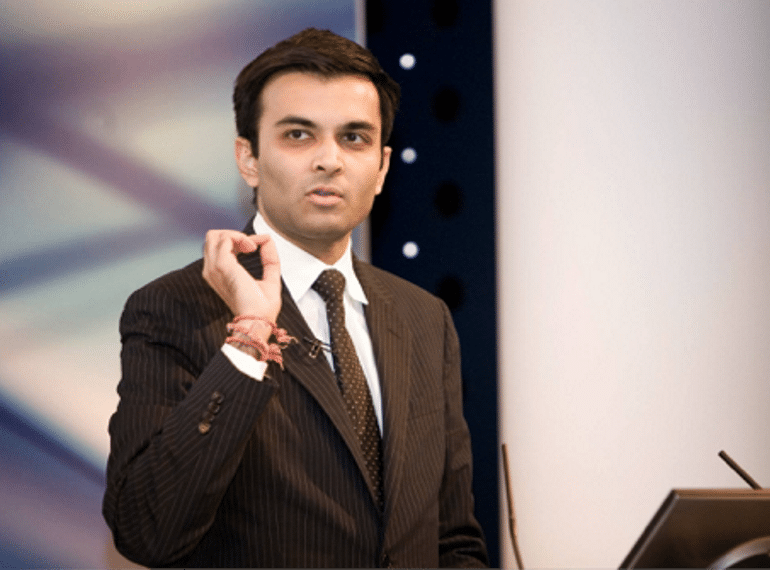
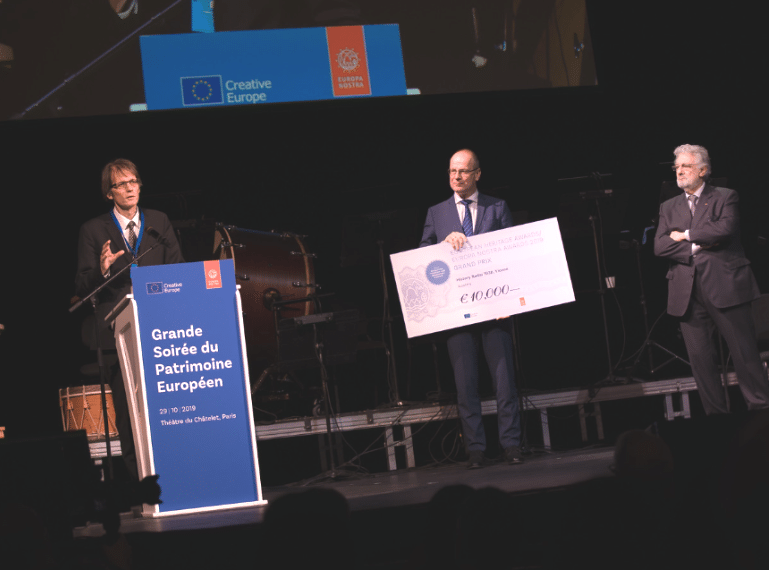
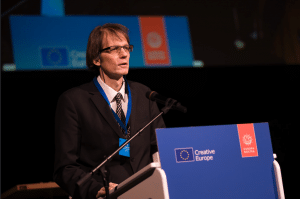 He led a team of filmmakers, historians and programmers involved in the project, which reached thousands of users via the internet, radio, television, and mobile phones, as well as through analogue media such as postcards, lectures, and print. In addition, it was the first digital exhibition on the website of the new Austrian Museum of History in Vienna.
He led a team of filmmakers, historians and programmers involved in the project, which reached thousands of users via the internet, radio, television, and mobile phones, as well as through analogue media such as postcards, lectures, and print. In addition, it was the first digital exhibition on the website of the new Austrian Museum of History in Vienna.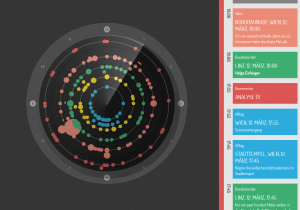 Following the success of the project during the 80th anniversary period last year, it was announced this year that it had won the European Heritage Award/Europa Nostra Award in the Education, Training and Awareness-Raising category. The project was one of only seven to be named as one of the awards’ Grand Prix.
Following the success of the project during the 80th anniversary period last year, it was announced this year that it had won the European Heritage Award/Europa Nostra Award in the Education, Training and Awareness-Raising category. The project was one of only seven to be named as one of the awards’ Grand Prix.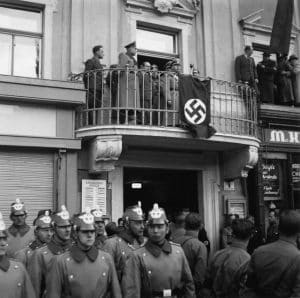 “This project has used innovative media to cast new light on pivotal historical moments in which crucial political decisions were taken. Curiosity was the driving force that provoked this historical storytelling, evoking the collective memory of eyewitnesses. The project’s pioneering technology allows for the constructive mediation of historical events.”
“This project has used innovative media to cast new light on pivotal historical moments in which crucial political decisions were taken. Curiosity was the driving force that provoked this historical storytelling, evoking the collective memory of eyewitnesses. The project’s pioneering technology allows for the constructive mediation of historical events.”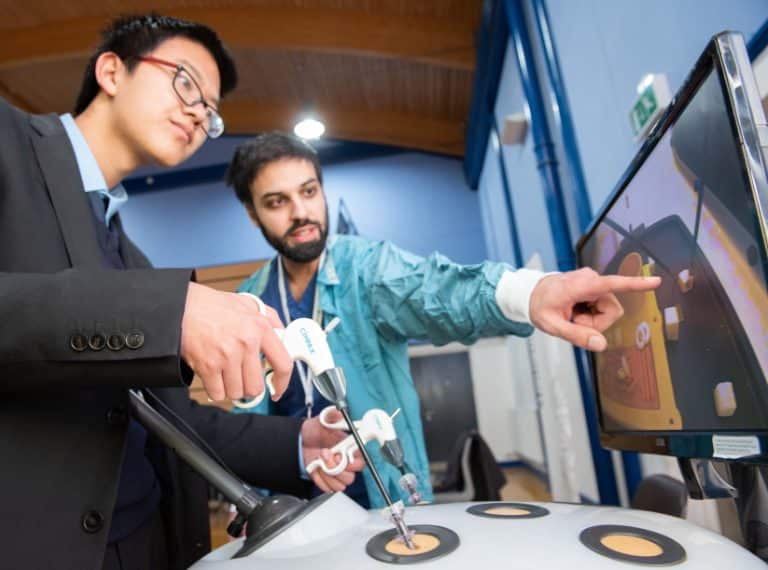
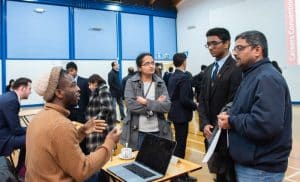 The convention – a major event in the QE calendar – this year featured an increased number of talks. The speakers for these were among representatives of 35 companies and organisations attending in total, including Old Elizabethans and other visitors.
The convention – a major event in the QE calendar – this year featured an increased number of talks. The speakers for these were among representatives of 35 companies and organisations attending in total, including Old Elizabethans and other visitors.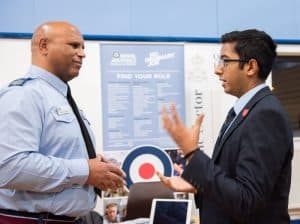 Headmaster Neil Enright said: “It was another tremendous evening. I am grateful to all those who helped our current pupils in this way, whether old boys or other friends of the School. The boys benefit immeasurably from the advice that they receive, not least because seeing alumni thriving in their various careers is in itself a source of inspiration and confidence to them.
Headmaster Neil Enright said: “It was another tremendous evening. I am grateful to all those who helped our current pupils in this way, whether old boys or other friends of the School. The boys benefit immeasurably from the advice that they receive, not least because seeing alumni thriving in their various careers is in itself a source of inspiration and confidence to them.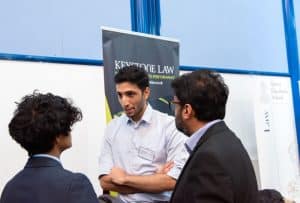 • Dental surgeon Dr Nirmal Wilwaraarachchi (OE 1996-2002) on dentistry
• Dental surgeon Dr Nirmal Wilwaraarachchi (OE 1996-2002) on dentistry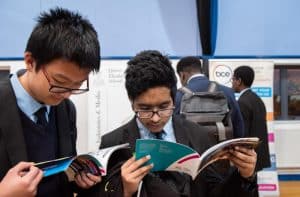 The evening also benefited from experts attending from organisations with which the School has strong partnerships, such as the National Citizen Service (whose summer programme is always popular with Year 11 boys), the STEM Ambassadors programme and the RAF.
The evening also benefited from experts attending from organisations with which the School has strong partnerships, such as the National Citizen Service (whose summer programme is always popular with Year 11 boys), the STEM Ambassadors programme and the RAF.
 The celebratory tone was amplified by a good attendance from the ‘ten-year leavers’ – the class of 2009–2010 – while older Elizabethans present included Brian Gilbert, returning to the School after a gap of 50 years.
The celebratory tone was amplified by a good attendance from the ‘ten-year leavers’ – the class of 2009–2010 – while older Elizabethans present included Brian Gilbert, returning to the School after a gap of 50 years. In his speech, Headmaster Neil Enright paid fulsome tribute to Mr Harris (HM 1984–1999): “Few can have had such a profound, transformational and lasting impact on Queen Elizabeth’s as Eamonn Harris, without whom we, quite simply, may well not be sitting here this evening.
In his speech, Headmaster Neil Enright paid fulsome tribute to Mr Harris (HM 1984–1999): “Few can have had such a profound, transformational and lasting impact on Queen Elizabeth’s as Eamonn Harris, without whom we, quite simply, may well not be sitting here this evening. Mr Enright reported on significant developments during the year, including “the exciting news that we have secured £2.2m of government funding…for our new Music School”.
Mr Enright reported on significant developments during the year, including “the exciting news that we have secured £2.2m of government funding…for our new Music School”. Mr Enright gave a warm, if piquant, welcome to the many ten-year leavers at table, pointing out that Assistant Head David Ryan had described this particular group “as his most challenging in all his years in the Sixth Form”!
Mr Enright gave a warm, if piquant, welcome to the many ten-year leavers at table, pointing out that Assistant Head David Ryan had described this particular group “as his most challenging in all his years in the Sixth Form”! He reported on the start of a project to digitise QE’s archives, beginning with photographs.
He reported on the start of a project to digitise QE’s archives, beginning with photographs. Mr Enright concluded his speech with a report on QE Connect, the School’s recently launched online community for alumni, which has gained more than 450 members in the space of just a few weeks.
Mr Enright concluded his speech with a report on QE Connect, the School’s recently launched online community for alumni, which has gained more than 450 members in the space of just a few weeks.